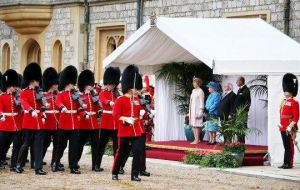MercoPress. South Atlantic News Agency
President Higgins visit to UK consolidates reconciliation after decades of mistrust
 The impressive display at Windsor Castle by the Queen to receive the Irish president
The impressive display at Windsor Castle by the Queen to receive the Irish president Queen Elizabeth II welcomed the Irish president to Britain on Tuesday for the first time since the republic became independent with a banquet also controversially attended by former IRA commander Martin Guinness.
The Windsor Castle dinner, attended by British Prime Minister David Cameron and a host of celebrities, was thrown as part of Irish President Michael D. Higgins' state visit as the once-hostile neighbors seek to consolidate their improving ties.
The historic state visit builds on the Queen's groundbreaking visit to Ireland in 2011, which helped put British-Irish relations on a new footing.
Shortly after guests took their seats at 8.40pm, the monarch welcomed Higgins to Britain and expressed her hopes for a “more settled future” between the two nations.
The presence of Northern Ireland's deputy first minister and ex-IRA commander McGuinness at the banquet was seen as particularly significant, as he snubbed a banquet in the Queen's honor in Dublin three years ago.
As a commander in the Irish Republican Army, McGuinness played a key role in the Troubles -- the three decades of sectarian violence between Northern Ireland's British Protestants and Irish Catholics.
The Sinn Fein politician made the psychological leap of meeting the Queen in Belfast in 2012.
Higgins earlier hailed the warm ties between the two nations, which he said once seemed “unachievable”.
Addressing both houses of parliament in London, Higgins said Ireland's bloody fight for independence from Britain, gained in 1922, “inevitably casts its long shadow across our relations”.
But the Queen's visit in 2011 had shown that where Britain and the republic once looked at each other with “doubtful eyes”, they could now view each other “through trusting eyes and mutual respect and shared commitment”.
In his speech at the Palace of Westminster, he said: “The relationship between our two islands has, as I have said, achieved a closeness and warmth that once seemed unachievable.”
Higgins, the first Irish president to make a state visit to Britain since independence in 1922, said both countries could take “immense pride” in their work towards peace in Northern Ireland.
Higgins and his wife Sabina were earlier treated to a spectacular ceremonial welcome in Windsor, west of London, comprising gun salutes and a glittering military parade involving 850 soldiers and 275 horses.
The president travelled with the queen to Windsor Castle in a horse-drawn carriage and conducted a troop inspection, before he presented a new red coat to the Irish wolfhound who acts as a mascot to the Irish Guards.
After a private lunch, the 72-year-old president returned to London and laid a wreath at the Grave of the Unknown Soldier at Westminster Abbey. His show of remembrance for the British military's fallen is highly symbolic, given the long history of the army in quelling dissent in Ireland.
At the evening banquet in Windsor Castle's grand Saint George's Hall, the Queen spoke warmly of her 2011 visit.
“Prince Philip and I recall our visit to Ireland with great pleasure,” she told guests, who included actors Judi Dench and Daniel Day-Lewis.
“Your people's famous hospitality -- and, of course, Ireland's thoroughbred horses -- all these and much more left a happy and enduring impression.”
She said the visits showed the two nations were becoming “good and dependable neighbors and better friends” who could look forward to a “more settled future”.
The violence in Northern Ireland was largely ended by the 1998 Good Friday peace accords, which paved the way for a power-sharing government in Belfast, but only after an estimated 3,500 people died.
Political relations between Britain and Ireland have steadily improved since then, building on a shared history, personal connections and strong trade between the two countries.





Top Comments
Disclaimer & comment rules-

-

-

Read all commentsSometimes politicians just play catch-up to everyday people.
Apr 09th, 2014 - 08:00 am 0#1 Absolutely correct. Every time I visit the emerald isle, north or south, there is warmth and humour in abundance. Irish people can vote in our elections if they live in Britain and many have chosen to. The fact that my granny was Irish entitles me to an Irish passport. On a personal level, during my lifetime, there has never been any divide between people. All the pomp is rather outdated and over the top, but its just our establishments way of healing a percieved rift.
Apr 09th, 2014 - 09:29 am 0But it takes some sort of Queen who can stop the rage showing when the McGunnness-factor stops in front of her Mountbatten sarcophagus.
Apr 09th, 2014 - 10:11 am 0I'm not sure I could be pleasant with my family-killers ... but, almost certainly, I have been.
Commenting for this story is now closed.
If you have a Facebook account, become a fan and comment on our Facebook Page!